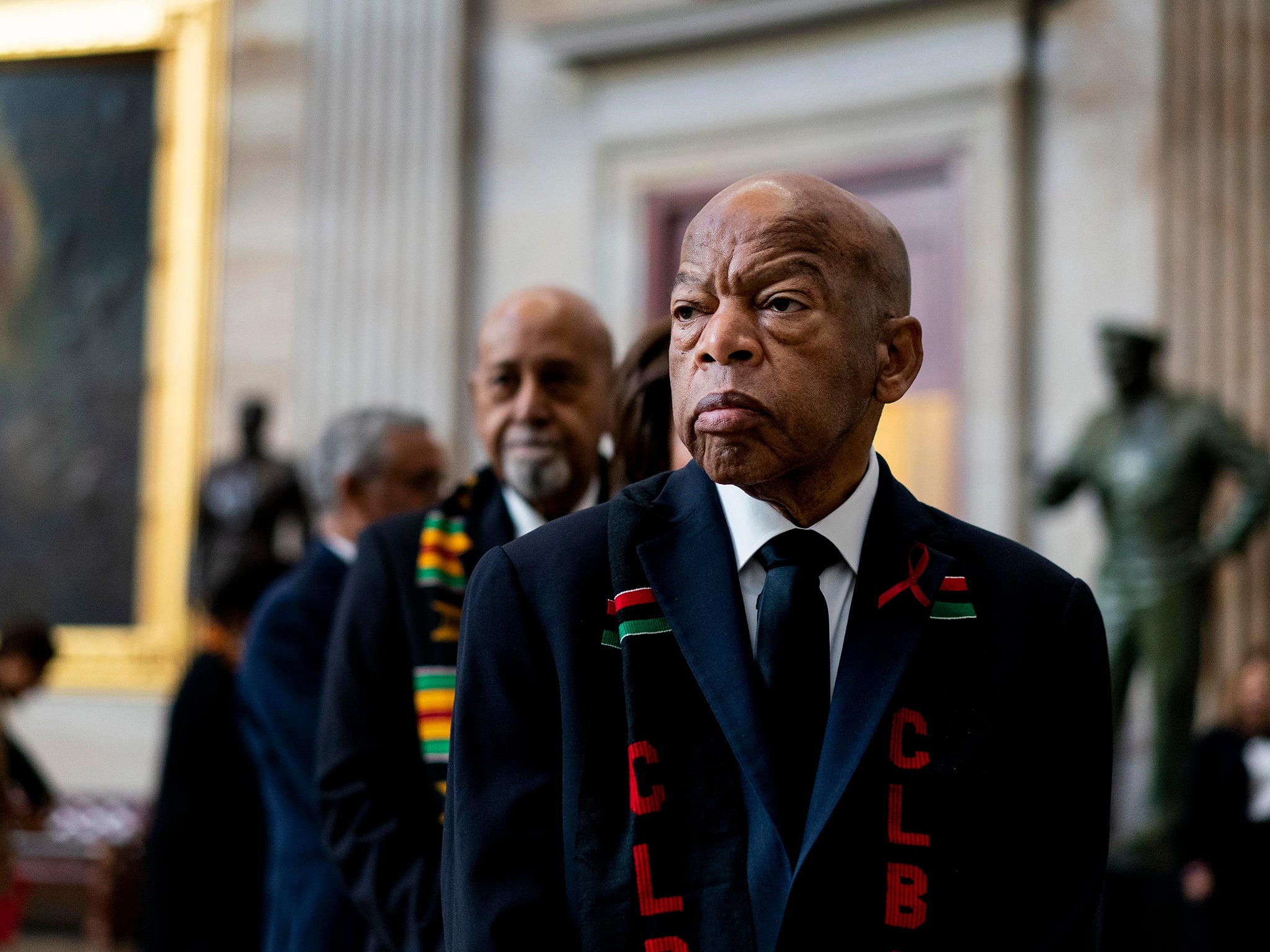John Lewis: Civil rights icon and ‘conscience of congress’ dies
Lewis was the youngest and last survivor of the Big Six civil rights activists, a group led by the Reverend Martin Luther King Jr

Your support helps us to tell the story
From reproductive rights to climate change to Big Tech, The Independent is on the ground when the story is developing. Whether it's investigating the financials of Elon Musk's pro-Trump PAC or producing our latest documentary, 'The A Word', which shines a light on the American women fighting for reproductive rights, we know how important it is to parse out the facts from the messaging.
At such a critical moment in US history, we need reporters on the ground. Your donation allows us to keep sending journalists to speak to both sides of the story.
The Independent is trusted by Americans across the entire political spectrum. And unlike many other quality news outlets, we choose not to lock Americans out of our reporting and analysis with paywalls. We believe quality journalism should be available to everyone, paid for by those who can afford it.
Your support makes all the difference.John Lewis, the civil rights icon and longtime Georgia congressman, has died of cancer. He was 80 years old.
Congressman Lewis was a towering figure of the civil rights movement, and later became known as the “conscience of congress” for his decades of service in the House of Representatives.
He one of the Big Six civil rights activists led by the Reverend Martin Luther King Jr, and was front and centre for the movement’s most pivotal moments.
Mr Lewis was one of the original Freedom Riders. He spoke to the massed crowds at the 1963 March on Washington, just before King delivered his “I Have a Dream” speech, during which he promised to “splinter the segregated south into a thousand pieces”.
In 1965, he led some 600 protesters in the Bloody Sunday march across the Edmund Pettus Bridge in Selma, Alabama, where he was brutally assaulted by police and left with a fractured skull. Images of the violent encounter drew national attention and led to more marches across the state. The Voting Rights Act was passed into law later that year.
He continued his struggle for racial justice and equality throughout his long career in congress, to which he was elected 17 times by the people of Georgia.
Throughout his life, he spoke often of his belief in “good trouble, necessary trouble,” to bring about change, but he was dedicated to non-violence.
Mr Lewis was in the midst of his battle with cancer when the police killing of George Floyd sparked the largest protests for racial justice since the civil rights era. Commenting on the historic demonstrations in June, he told CBS: “You cannot stop the call of history.”
“You may use troopers. You may use fire hoses and water, but it cannot be stopped. There cannot be any turning back. We have come too far and made too much progress to stop now and go back,” he said.
His influence was felt throughout the generations. When Barack Obama was inaugurated in 2009, becoming America’s first black president, he handed Mr Lewis a photograph signed with the words: “Because of you, John.” The two of them marched hand in hand in Selma on the 50th anniversary of the Bloody Sunday attack.
In a statement to mark the congressman’s passing, Mr Obama said he “not only gave all of himself to the cause of freedom and justice, but inspired generations that followed to try to live up to his example”.
“I first met John when I was in law school, and I told him then that he was one of my heroes. Years later, when I was elected a US senator, I told him that I stood on his shoulders. When I was elected president of the United States, I hugged him on the inauguration stand before I was sworn in and told him I was only there because of the sacrifices he made. And through all those years, he never stopped providing wisdom and encouragement to me and Michelle and our family. We will miss him dearly,” Mr Obama said in a statement.

Mr Lewis, who has served in congress since 1987, announced in December last year that he had been diagnosed with stage four pancreatic cancer. Doctors detected the disease during a routine medical visit.
“I have been in some kind of fight – for freedom, equality, basic human rights – for nearly my entire life,” he said at the time. “I have never faced a fight quite like the one I have now.”
His family confirmed his death in a statement released late on Friday evening.
“He was honoured and respected as the conscience of the US congress and an icon of American history, but we knew him as a loving father and brother,” the statement said. “He was a stalwart champion in the ongoing struggle to demand respect for the dignity and worth of every human being.”
House speaker Nancy Pelosi called him “one of the greatest heroes of American history.”
“All of us were humbled to call congressman Lewis a colleague, and are heartbroken by his passing,” Ms Pelosi said.
“May his memory be an inspiration that moves us all to, in the face of injustice, make ‘good trouble, necessary trouble.’”
The tributes to Mr Lewis came in from both sides of the aisle. Senate majority leader Mitch McConnell described him as “a pioneering civil rights leader who put his life on the line to fight racism, promote equal rights and bring our nation into greater alignment with its founding principles”.
Join our commenting forum
Join thought-provoking conversations, follow other Independent readers and see their replies
Comments